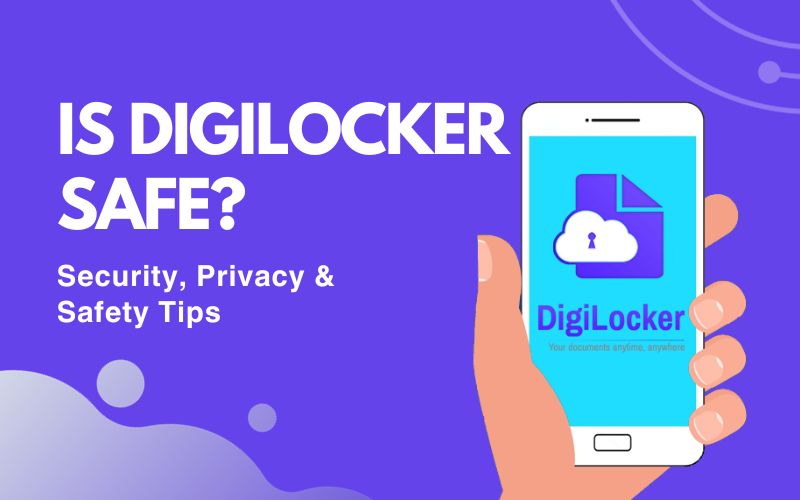Concerned about is DigiLocker safe? Discover the security measures, privacy policies, and user tips in our comprehensive guide.

In the era of digitalization, where paperwork is being replaced by online platforms, DigiLocker has emerged as a convenient solution for storing and sharing important documents electronically. However, with the increasing reliance on digital platforms, concerns about the safety and security of personal information have become more prevalent. In this article, we will delve into the question on everyone’s mind: Is DigiLocker safe?

Understanding DigiLocker:
What is DigiLocker?
DigiLocker is a flagship initiative by the Government of India under the Digital India campaign. Launched in 2015, it aims to provide a secure and convenient platform for citizens to store and access their crucial documents digitally. This cloud-based service enables users to upload and share documents such as Aadhar cards, driving licenses, educational certificates, and more.

The Security Infrastructure:
1. Aadhaar Authentication:
One of the primary security measures in DigiLocker is the use of Aadhaar authentication. Users need to link their Aadhaar number to create an account, adding an extra layer of identity verification.
You May Also Read: Is Masked Aadhaar Valid or Legal – A Complete Guide
2. Encryption Protocols:
DigiLocker employs robust encryption protocols to safeguard user data. The platform uses 256-bit SSL encryption for data transmission, which is the same level of security used by banks for online transactions. This ensures that the information exchanged between users and the DigiLocker servers remains confidential and protected from unauthorized access.
3. Two-Factor Authentication (2FA):
To add an extra layer of security, DigiLocker incorporates Two-Factor Authentication. This means that even if someone manages to obtain your login credentials, they would still need a second form of verification, such as an OTP (One-Time Password) sent to your registered mobile number, to access your account.
4. Biometric Authentication:
DigiLocker also provides an option for biometric authentication, enhancing the security measures. Users can link their Aadhar card with DigiLocker and use Aadhar-based biometric authentication to access their documents. This feature adds an additional level of identity verification, making it more challenging for unauthorized individuals to gain access.
5. Mobile Number Authentication:
Users are required to verify their mobile numbers during the registration process. This adds an extra layer of security, as notifications and OTPs are sent to the registered mobile number for authentication.
6. Two-Factor Authentication (2FA):
DigiLocker incorporates two-factor authentication to enhance security. Users need to provide a second form of verification, such as an OTP sent to their registered mobile number, in addition to their password during login.

Addressing Concerns: DigiLocker is Safe or Not?
DigiLocker is a government of India initiative that provides a secure and reliable platform for citizens to store and access their important documents and certificates in a digital format. DigiLocker is considered safe to use thanks to its robust security measures, including:
- Data Privacy:
One of the major concerns surrounding DigiLocker is data privacy. Users worry about the safety of their personal information stored on the platform. It’s important to note that DigiLocker follows stringent data privacy policies, and access to documents is restricted to the user and entities authorized by the user. - Government Access:
Another concern is the potential for government access to personal documents. While the government has facilitated the creation of DigiLocker, the platform emphasizes user control. Documents can only be shared with the user’s consent, and the user retains complete control over their data. - Cybersecurity Threats:
Given the rising prevalence of cyber threats, users are rightfully concerned about the security of their documents on DigiLocker. The platform, however, employs robust cybersecurity measures, including encryption and authentication protocols, to safeguard user data against unauthorized access and cyberattacks. - Unauthorized Access:
The fear of unauthorized access to DigiLocker accounts is understandable. However, with features like biometric locking, two-factor authentication, and Aadhaar verification, DigiLocker aims to prevent unauthorized users from gaining access to an individual’s documents.
User Privacy and Data Ownership:
1. User Control:
One of the key aspects contributing to the safety of DigiLocker is the level of control users have over their data. Users can choose which documents to upload, share, and with whom. This level of autonomy empowers users to manage their digital documents according to their preferences and needs.
2. Data Ownership:
DigiLocker operates under the principle of data ownership. This means that the data uploaded by users belongs to them, and the platform acts as a secure repository. The government or any other entity cannot access or use the user’s data without explicit consent.
Legal Framework and Compliance:
1. Compliance with IT Act:
DigiLocker adheres to the Information Technology Act, ensuring that the platform operates within the legal framework set by the Indian government for electronic transactions and data protection. This legal foundation adds a layer of assurance regarding the safety of using DigiLocker.
2. Data Protection Measures:
The platform follows stringent data protection measures outlined in the IT Act, including guidelines for the collection, storage, and transmission of sensitive information. These measures are designed to prevent data breaches and unauthorized access.
Challenges and Controversies:
1. Perceived Risks:
Despite the security measures in place, there have been concerns and misconceptions regarding the safety of DigiLocker. Some users worry about potential data breaches, while others fear that the government might misuse the stored information.
2. Educational Initiatives:
To address these concerns, DigiLocker has undertaken educational initiatives to inform users about the security features and dispel any myths. Creating awareness about the platform’s security protocols is crucial for fostering trust among users.
Tips for Safe Usage:
- Regularly Update Passwords:
To ensure the safety of your DigiLocker account, it’s essential to keep the application and your device updated. - Secure Password Practices:
Adopting strong password practices is fundamental for any online platform. avoid using easily guessable birthdates or names. - Enable Biometric Locking:
Activate the biometric locking feature to add an extra layer of protection to your account. - Be Mindful of Sharing:
Exercise caution when sharing documents. Only share them with authorized entities, and avoid sharing sensitive information unnecessarily. - Verify Authorized Entities:
Before granting access to any organization or government department, verify their authenticity to prevent misuse of your documents. - Monitor Account Activity:
Regularly check your DigiLocker account activity to identify any suspicious or unauthorized access.
Final Words:
In conclusion, DigiLocker, with its robust security features, is a safe and convenient platform for storing and managing digital documents. While concerns about data privacy and cybersecurity are valid, the platform has implemented measures to address these worries and prioritize user control. By following best practices for online security and staying informed about updates and improvements, users can confidently utilize DigiLocker as a secure and efficient tool in the digital landscape. As technology evolves, DigiLocker continues to play a vital role in India’s journey towards a paperless and secure future.

Hi I am Harish. I am a blogger, writer. I am also a photographer. I love to share my thoughts and experiences through the words in my blog. Thank you.



